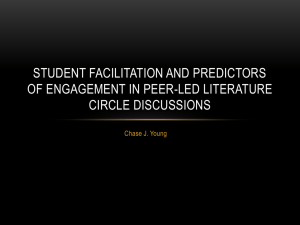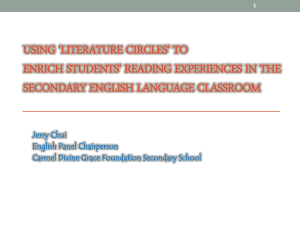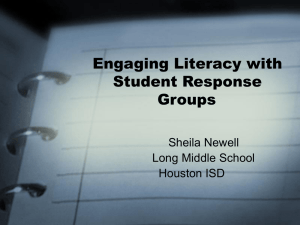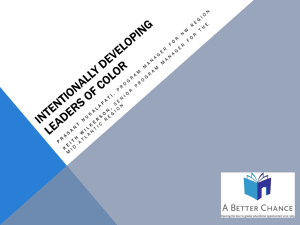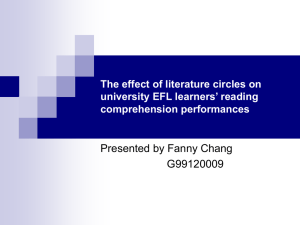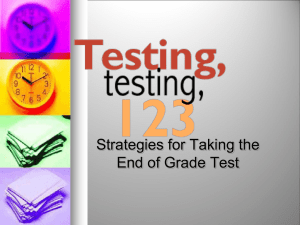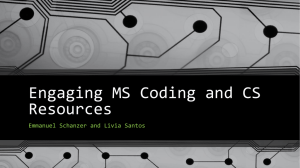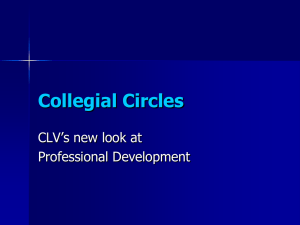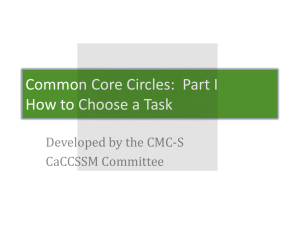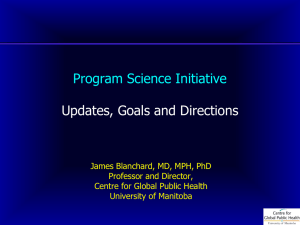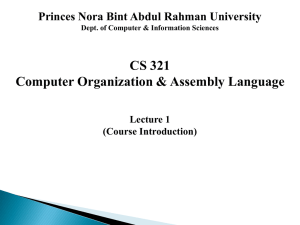Literature Circle Power Point
advertisement
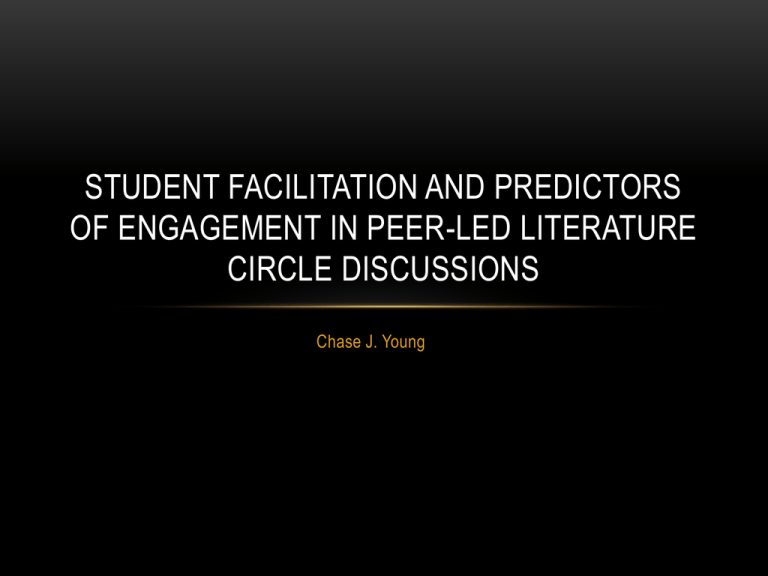
STUDENT FACILITATION AND PREDICTORS OF ENGAGEMENT IN PEER-LED LITERATURE CIRCLE DISCUSSIONS Chase J. Young WHAT DO TEACHER WANT TO KNOW ABOUT LITERATURE CIRCLES • We want to know that Literature Circles are authentic, high-level, and effective. • VIDEO – Reading Circles • VIDEO - Example Literature Circles in 3 rd Grade • Discuss: If your literature circles are working, then rejoice! WHAT DO TEACHER WANT TO KNOW ABOUT LITERATURE CIRCLES? • We want to know that LCs are authentic. • Free flowing discussions • Choice • Text • Topic • VIDEO - Fourth Grade Literature Circles • Discuss: texts and topics WHAT DO TEACHER WANT TO KNOW ABOUT LITERATURE CIRCLES? • We want to know that students are thinking on high levels. • Assessing Discourse • High-level Talk (Rubric) • Comprehension (Response) • VIDEO - Snyderites Practice Literature Circles (Reflect) • Facilitation • A long interesting journey… THEORETICAL CONSIDERATION • Scaffolding • Not adding support, but carefully removing support to foster independence • Students in LCs should be closer to independence METHODOLOGY • Tharp and Gallimore (1988) deemed insufficient and felt forced on the data • Modeling – What is it in the context of peer-led LCs? • Contingency Managing – Should students be responsible for this? • Feedback – Does all feedback facilitate discussion? • Questioning – Do all questions instigate deeper level discussions? • Cognitive Structuring – Should this definition include how the brain changes? • Instructing – Is this the job of the students? METHODOLOGY • Li et al. (2007) deemed insufficient and felt forced • Planning and Organizing – Should this be done by the teacher prior to LCs? • Topic Control – How do students control the topic? • Acknowledgement – Is mere acknowledgement beneficial in LCs? • Argument Development – Development assumes a thread of discourse rather than an utterance • Turn Management – Does this inhibit free-flowing discussions? FLOW OF CODING FACILITATIVE FUNCTIONS THARP AND GALLIMORE LI ET AL. (2007) • Modeling – Eliminated • Planning and Organizing – Eliminated • Contingency Managing – Eliminated • Feedback – Included only if elaborative • Topic Control – Renamed Topic Management if facilitative (exploratory talk or confessional) • Questioning – Included in Exploratory Talk if high-level • Acknowledgement – Eliminated • Cognitive Structuring – Eliminated • Instructing – Eliminated • Argument Development – Eliminated • Turn Management – Eliminated FLOW OF CODING FACILITATIVE FUNCTIONS • Deemed Facilitative • Non-Facilitative • Exploratory Talk (CC) • Feedback • Elaborative Feedback (CC) • Unrelated • Topic Management (CC) • Confessionals (Open) • Accountability (Open) QUALITATIVE RESULTS The researcher observed students facilitating discussions in five ways: • Exploratory Talk • • Elaborative Feedback • • Introducing important topics and big ideas as well as changing topic through facilitation Confessionals • • Agreeing or disagreeing and providing reasoning or text evidence Topic Management • • Asking questions that are open ended that expect high-level responses and statements that allow for debate Admitting when meaning breaks down and asking for help from group members Accountability • Making sure all group members participate and back up their contributions and questions with text-evidence WHAT DO TEACHER WANT TO KNOW ABOUT LITERATURE CIRCLES? • We want to know that LCs are effective. • Text Selection (3rd Grade Regression –Reading Ability) • Group Size • Post Hoc Regression (4 th Grade – Groups of 3 -66%) • Personality (TIPI) • Regression 3rd Grade (Extroversion and Lack of Contentiousness) • Regression 4th Grade (Emotional Stability) • Reading ability wanes WHAT DO TEACHER WANT TO KNOW ABOUT LITERATURE CIRCLES? • How do we implement literature circles? • Prepare: Quality literature, small groups, and intentional placement of personalities • Teach: High-level discussion techniques and facilitative functions PROMOTING HIGH-LEVEL DISCUSSION • Input • Name, Recall, Restate, Reread, Locate, Describe, State, Inform, Define, Identify, List • Process • Compare, Contrast, Classify, Distinguish, Explain (Why), Infer, Sequence, Analyze, Synthesize, Make Analogies, Reason • Output • Evaluate, Generalize, Imagine, Judge, Predict, Speculate, If/Then, Apply a Principle, Hypothesize, Forecast, Idealize PROMOTING HIGH-LEVEL DISCUSSION • I wonder, I realized, I can connect with, This is giving me the idea that, I think, I disagree with...because…, I wish, I hope, I know, I predict, I think the main idea is, I think the main idea of the chapter is, There is one thing I do not like, and it is, The author should have, I think ____ is like ____ because, This connects with, (Name) helped me understand, I partly agree with , At first I thought...now I think...because…, I agree with (Name) because…, My favorite part was…because, I don’t know why, I liked…because…, I think the author’s purpose is, I was surprised, I was confused, I used context clues, I do not get…, What if…, Why…, How do you know?, What do you mean?, Can you repeat that?, How did…?, Do you think…? • Teach facilitation. FURTHER RESEARCH • Teaching Facilitative Functions to improve student discourse • Facilitative Function Order of Importance • Benefits of LCs on higher and lower readers • Personality’s impact on LC discussions • Personality’s impact on LC discussions across grade levels • Group size and quality of LC discussions • Measuring comprehension on the go
